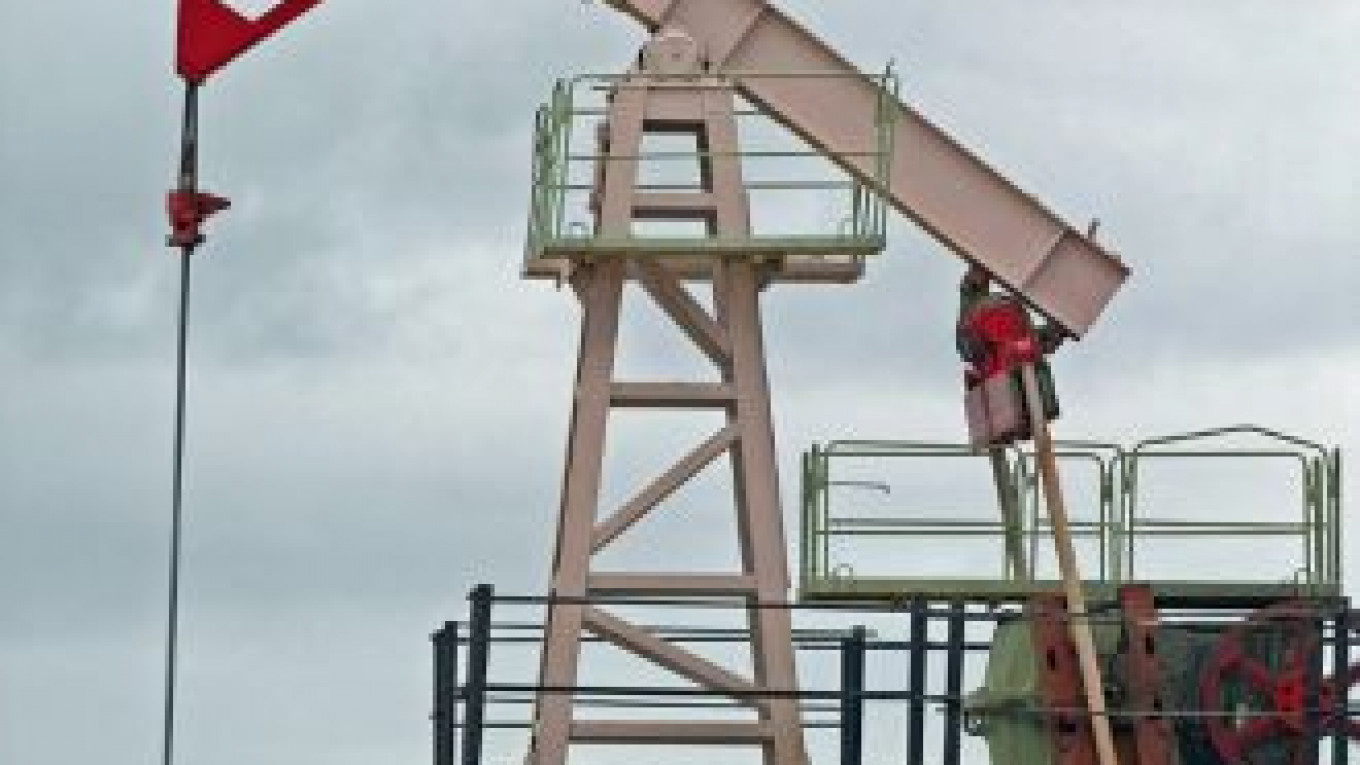Russia's oil output edged up 0.2 percent to 10.26 million barrels per day in May, matching a post-Soviet record seen in October, as companies including Rosneft ramp up production on the back of high crude prices.
Rosneft, the country's top crude producer and responsible for more than a fifth of the country's oil output, led the pack with a 0.7 percent monthly increase to 2.3 million bpd, Energy Ministry data showed Thursday.
According to the International Energy Agency, Russia's oil production peaked at 11.41 million bpd in 1988, when it was still part of the Soviet Union. Russia accounted for 90 percent of total Soviet oil output.
The country is expected to produce 10.26 million bpd of crude in 2011, up about 1.1 percent from 2010.
"The output production increased faster mainly due to favorable external factors, including high prices and rising demand," Valery Nesterov from Troika Dialog said.
"Looks like production will rise by around 1 percent during the whole year … But the companies are at a crossroad in terms of whether to increase investments or not as the government doesn't send clear signals about its tax policy," he added.
Russia remains the world's top crude producer, ahead of quota-bound Saudi Arabia, which pumped 8.95 million bpd in May, according to a Reuters survey.
The Organization of the Petroleum Exporting Countries meets on June 8 in Vienna to review its output policy, which it has not changed since it agreed to a record cut in production in December 2008 in the aftermath of economic crisis. Russia is not a member of OPEC.
An OPEC delegate said Thursday that the cartel is considering increasing its output target by as much as 1.5 million bpd.
Rosneft showed growth at Vankor, its key source of new output and its supplier to China, which was shown pumping 294,000 bpd in May, up from 287,000 bpd in April, despite suggestions that Rosneft had cut its targets for the field.
Rosneft president Eduard Khudainatov said in December that Vankor would yield 15 million tons of oil rather than a previously forecast 17 million. Then last month a pipeline executive said Vankor could produce only 13 million in 2011.
But the data showed Vankor pumping above its daily average of 284,000 bpd for the first five months of the year and on track to produce a total of 14 million tons if it sustains current rates.
Production by LUKoil, the country's No. 2 oil producer, continued to fall, declining 5.6 percent year on year.
"LUKoil has made a mistake with geology at its new South Khylchuyu field. Looks like we have to live with LUKoil's oil falling production now," UralSib analyst Alexei Kokin said.
Companies working under production sharing agreements in Russia, including Exxon-led Sakhalin-1, decreased their output in May by 2.6 percent month on month, although overall it increased 7.8 percent from the year-earlier period. An Exxon spokeswoman in Moscow declined to comment.
TNK-BP, half-owned by BP, managed to edge its oil output up 0.6 percent from April to 6.13 million tons.
Overall gas production in Russia declined 2.7 percent to 1.86 billion cubic meters per day last month from 1.91 bcm in April because of seasonal fluctuations.
Daily output at Gazprom, the world's largest natural gas producer, fell 2.7 percent from April to 1.43 bcm. The company plans to increase its 2011 production to 519 bcm from 508.6 bcm last year.
On Wednesday, Gazprom deputy chief executive Alexander Ananenkov issued a strong warning that the company's production may decline if the government goes ahead with a massive hike in taxes aimed to extract more money from the state-run company to plug its budget deficit.
The Finance Ministry has said gas producers other than Gazprom will be largely exempt from the expected $18 billion in tax increases in 2012 2014.
Novatek, Russia's top non-state gas company controlled by Gennady Timchenko, boosted its gas production in May by 56 percent year on year thanks to new acquisitions. Its output edged up 0.1 percent to 4.09 billion cubic meters in May from April.
The overall headcount at LUKoil declined 9.4 percent in 2010, the company said in its earnings report, Interfax reported.
The biggest staff cuts were in the upstream business segment, where headcount declined 11.8 percent. In refining, staff was reduced by 2 percent. Much of the reduction reflects the spinoff of noncore service units. LUKoil cut staff almost 6 percent in 2009.
A Message from The Moscow Times:
Dear readers,
We are facing unprecedented challenges. Russia's Prosecutor General's Office has designated The Moscow Times as an "undesirable" organization, criminalizing our work and putting our staff at risk of prosecution. This follows our earlier unjust labeling as a "foreign agent."
These actions are direct attempts to silence independent journalism in Russia. The authorities claim our work "discredits the decisions of the Russian leadership." We see things differently: we strive to provide accurate, unbiased reporting on Russia.
We, the journalists of The Moscow Times, refuse to be silenced. But to continue our work, we need your help.
Your support, no matter how small, makes a world of difference. If you can, please support us monthly starting from just $2. It's quick to set up, and every contribution makes a significant impact.
By supporting The Moscow Times, you're defending open, independent journalism in the face of repression. Thank you for standing with us.
Remind me later.






